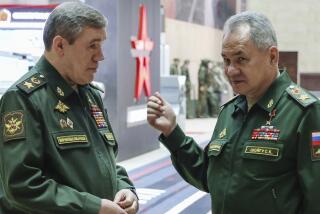Separatists Tied to ’99 Bombings
- Share via
MOSCOW — Muslim separatists are responsible for three bombings that killed 243 people, Russian prosecutors said Wednesday, incidents that reignited the war in Chechnya and propelled Vladimir V. Putin into the president’s office.
Critics saw the announcement of the end of the investigation of the 1999 bombings as designed to curb speculation that the attacks were orchestrated by Russian officials seeking to create a pretext for action against Chechnya.
The two bombings in Moscow and one in Volgodonsk were organized by two Arabs, later killed by Russian forces, who were leaders of separatist guerrillas in Chechnya, the Russian prosecutor general’s office said. It also named seven other accused, of whom two are in custody, two are fugitives and three are dead.
These bombings and another apartment blast that year in the Dagestan region, quickly blamed on Chechen rebels, became one of the justifications for sending Russian troops back into Chechnya -- a move that launched the second war there in a decade. That show of toughness helped Putin, who was prime minister at the time, win election as president.
Self-exiled tycoon Boris Berezovsky and other critics allege that the Federal Security Service, or FSB, the domestic successor to the Soviet-era KGB, may have been involved in the bombings in pursuit of political goals. That idea has been vehemently denounced by Russian authorities, but suspicions remain widespread.
Just two weeks ago, Sergei Yushenkov, a liberal lawmaker and outspoken critic of Putin, was shot to death outside his Moscow apartment in what allies called a political assassination. Some observers speculated that the killing was connected to his role in an unofficial investigation into the apartment bombings.
Critics saw Wednesday’s announcement as an effort to declare all questions about the 1999 bombings resolved before attention focuses on December parliamentary elections and March presidential balloting.
“I have no doubts that this investigation has been conducted to suit the interests of the Kremlin rather than to find out the truth,” said Pavel Voshchanov, a onetime spokesman for former President Boris Yeltsin. “I am sure the investigation is being wrapped up today to suit the political agenda of the Kremlin and to make the public at large forget about this dark episode in recent Russian political history.”
Voshchanov, now a political analyst and columnist for the daily newspaper Tribuna, said that “the presidential image built on pure PR actions and pure populism needs more boosting.”
“The current investigation results are intended to show to the public at large -- which is already tired of asking questions -- that law and order is under tight control, and such a heinous crime as the blasting of the apartment houses has been successfully resolved,” Voshchanov said. “I have no doubt that it hasn’t. But the general public will not question the findings of the prosecutor general’s investigation.”
Omar Ibn al Khattab and his aide Abu Umar masterminded the bombings, prosecutors said. The former, identified as Saudi or Jordanian born, became prominent under just the name Khattab when he was known as a warlord accused by Moscow of running terrorist training camps in Chechnya.
The Russian news agency Interfax reported that Khattab and Abu Umar “were killed during the counter-terrorist operation in Chechnya.” Some reports have said Khattab was poisoned.
The suspects in custody, who will now go on trial, are Yusuf Krymshamkhalov and Adam Dekkushev. They have been charged with terrorism, deliberate murder with aggravating circumstances, participation in illegal armed units and illegal possession of arms. It was previously reported they took refuge in Georgia’s Pankisi Gorge, on the border with Chechnya, where they were arrested last year and then turned over to Russia.
Both have previously been identified as ethnic Karachais, a group centered in Karachayevo-Cherkessia, a republic near Chechnya in Russia’s Caucasus region. Authorities have said some others suspected of involvement are ethnic Avars, a group centered in Dagestan, which borders Chechnya. All three republics are mostly Muslim.
The fugitives, Achemez Gochiyayev and Khakim Abayev, may be hiding in Georgia, Interfax reported. Gochiyayev allegedly rented space to store explosives in the two Moscow buildings that were blown up, and Abayev allegedly accompanied an explosives shipment.
“This investigation hasn’t answered the main question: Who ordered the apartment blasts in Moscow and Volgodonsk,” said Anna Politkovskaya, a political analyst and specialist on Chechnya for the daily newspaper Novaya Gazeta. “The accusations raised by some politicians that the FSB may have been behind the explosions have never been seriously considered by this investigation and have never been investigated at all. And it is quite clear that it will never happen.”
That means that “it remains up to independent journalists and a very small circle of independent politicians to continue to dig up this tragic riddle,” Politkovskaya said.
“The last politician in Russia who sincerely raised these hard questions was Sergei Yushenkov. But he was killed.”
Sergei L. Loiko in Moscow contributed to this report.
More to Read
Sign up for Essential California
The most important California stories and recommendations in your inbox every morning.
You may occasionally receive promotional content from the Los Angeles Times.










